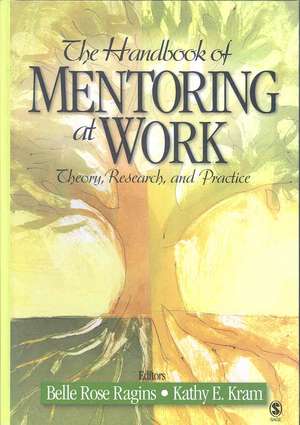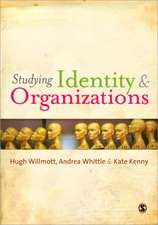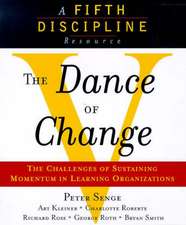The Handbook of Mentoring at Work: Theory, Research, and Practice
Autor Belle Rose Ragins, K. E. Kramen Limba Engleză Hardback – 3 dec 2007
Preț: 1099.30 lei
Preț vechi: 1505.89 lei
-27% Nou
Puncte Express: 1649
Preț estimativ în valută:
210.42€ • 228.64$ • 176.87£
210.42€ • 228.64$ • 176.87£
Carte tipărită la comandă
Livrare economică 21 aprilie-05 mai
Preluare comenzi: 021 569.72.76
Specificații
ISBN-13: 9781412916691
ISBN-10: 1412916690
Pagini: 760
Dimensiuni: 178 x 254 x 46 mm
Greutate: 1.46 kg
Ediția:1
Editura: SAGE Publications
Colecția Sage Publications, Inc
Locul publicării:Thousand Oaks, United States
ISBN-10: 1412916690
Pagini: 760
Dimensiuni: 178 x 254 x 46 mm
Greutate: 1.46 kg
Ediția:1
Editura: SAGE Publications
Colecția Sage Publications, Inc
Locul publicării:Thousand Oaks, United States
Recenzii
"This handbook is poised to become a classic in career and mentoring literature with its potential long-term heuristic usefulness in generating new intersections among theory,research, and practice...it is encouraging that so much of the handbook establishes grounds for future communication research and relates directly to current trends in organizational and managerial communication."
—MANAGEMENT COMMUNICATION QUARTERLY
"Its scope is wide but generally appropriate to its vision, and unlike some handbooks, there is substantial cross-referencing within the chapters. And the introductory and concluding chapters are excellent. Doctoral students will find that the Handbook provides a rich summary of extant studies and terrific ideas for future research. Mentoring researchers will find this a vital book to have on the shelf."
—MANAGEMENT COMMUNICATION QUARTERLY
"Its scope is wide but generally appropriate to its vision, and unlike some handbooks, there is substantial cross-referencing within the chapters. And the introductory and concluding chapters are excellent. Doctoral students will find that the Handbook provides a rich summary of extant studies and terrific ideas for future research. Mentoring researchers will find this a vital book to have on the shelf."
Cuprins
Section I. Introduction
Chapter 1. The Roots and Meaning of Mentoring - Belle Rose Ragins and Kathy E. Kram
Section II. Mentoring Research: Past, Present, and Future
Chapter 2. The Role of Personality in Mentoring Relationships: Formation, Dynamics, and Outcomes - Daniel B. Turban and Felissa K. Lee
Chapter 3. Mentoring and Career Outcomes: Conceptual and Methodological Issues in an Emerging Literature - Thomas W. Dougherty and George F. Dreher
Chapter 4. Mentoring as a Forum for Personal Learning in Organizations - Melenie J. Lankau and Terri A. Scandura
Chapter 5. Mentoring Relationships From the Perspective of the Mentor - Tammy D. Allen
Chapter 6. Mentoring and Leadership: Standing at the Crossroads of Theory, Research and Practice - Veronica M. Godshalk and John J. Sosik
Chapter 7. Mentoring and Organizational Socialization: Networks for Work Adjustment - Georgia T. Chao
Chapter 8. Gender and Mentoring: Issues, Effects, and Opportunities - Carol McKeen and Merridee Bujaki
Chapter 9. Unfinished Business: The Impact o Race o Understanding Mentoring Relationshi - Stacy D. Blake-Beard, Audrey Murrell, and David Thomas
Chapter 10. Formal Mentoring Programs: A ?Poor Cousin? to Informal Relationships - S. Gayle Baugh and Ellen A. Fagenson-Eland
Chapter 11. Peer Mentoring Relationships - Joyce E. A. Russell and Stacy E. McManus
Chapter 12. E-mentoring: Next Generation Research Strategies and Suggestions - Ellen A. Ensher and Susan Elaine Murphy
Chapter 13. Understanding Relational Problems in Mentoring: A Review and Proposed Investment Model - Lillian T. Eby
Section III. Mentoring Theory: Applying New Lenses and Perspectives
Chapter 14. Developmental Initiation and Development Networks - Monica C. Higgins, Dawn E. Chandler, and Kathy E. Kram
Chapter 15. Stone Center Relational Cultural Theory: A Window on Relational Mentoring - Joyce K. Fletcher and Belle Rose Ragins
Chapter 16. A Constructive-Developmental Theoretical Approach to Mentoring Relationships - Eileen M. McGowan, Eric M. Stone, and Robert Kegan
Chapter 17. The Role of Emotional Intelligence in the Mentoring Process - Cary Cherniss
Chapter 18. Mentoring for Intentional Behavioral Change - Richard E. Boyatzis
Chapter 19. Career Cycles and Mentoring - Douglas T. Hall and Dawn E. Chandler
Chapter 20. Mentoring Enactment Theory: Describing, Explaining and Predicting Communication in Mentoring Relationships - Pamela J. Kalbfleisch
Chapter 21. Mentoring and the Work-Family Interface - Jeffrey H. Greenhaus and Romila Singh
Section IV. Mentoring in Practice: Programs and Innovations
Chapter 22. Advancing Women Through the Glass Ceiling With Formal Mentoring - Katherine Giscombe
Chapter 23. Designing Relationships for Learning Into Leader Development Programs - Cynthia D. McCauley and Victoria A. Guthrie
Chapter 24. The Practice of Mentoring: MENTTIUM Corporation - Lynn P-Sontag and Kimberly Vappie, and Connie R. Wanberg
Chapter 25. Blind Dates? The Importance of Matching in Successful Formal Mentoring Relationships - Stacy D. Blake-Beard, Regina M. O?Neill, and Eileen M. McGowan
Chapter 26. An International Perspective on Mentoring - David Clutterbuck
Section V: Integration
Chapter 27. The Landscape of Mentoring in the 21st Century - Kathy E. Kram and Belle Rose Ragins
Chapter 1. The Roots and Meaning of Mentoring - Belle Rose Ragins and Kathy E. Kram
Section II. Mentoring Research: Past, Present, and Future
Chapter 2. The Role of Personality in Mentoring Relationships: Formation, Dynamics, and Outcomes - Daniel B. Turban and Felissa K. Lee
Chapter 3. Mentoring and Career Outcomes: Conceptual and Methodological Issues in an Emerging Literature - Thomas W. Dougherty and George F. Dreher
Chapter 4. Mentoring as a Forum for Personal Learning in Organizations - Melenie J. Lankau and Terri A. Scandura
Chapter 5. Mentoring Relationships From the Perspective of the Mentor - Tammy D. Allen
Chapter 6. Mentoring and Leadership: Standing at the Crossroads of Theory, Research and Practice - Veronica M. Godshalk and John J. Sosik
Chapter 7. Mentoring and Organizational Socialization: Networks for Work Adjustment - Georgia T. Chao
Chapter 8. Gender and Mentoring: Issues, Effects, and Opportunities - Carol McKeen and Merridee Bujaki
Chapter 9. Unfinished Business: The Impact o Race o Understanding Mentoring Relationshi - Stacy D. Blake-Beard, Audrey Murrell, and David Thomas
Chapter 10. Formal Mentoring Programs: A ?Poor Cousin? to Informal Relationships - S. Gayle Baugh and Ellen A. Fagenson-Eland
Chapter 11. Peer Mentoring Relationships - Joyce E. A. Russell and Stacy E. McManus
Chapter 12. E-mentoring: Next Generation Research Strategies and Suggestions - Ellen A. Ensher and Susan Elaine Murphy
Chapter 13. Understanding Relational Problems in Mentoring: A Review and Proposed Investment Model - Lillian T. Eby
Section III. Mentoring Theory: Applying New Lenses and Perspectives
Chapter 14. Developmental Initiation and Development Networks - Monica C. Higgins, Dawn E. Chandler, and Kathy E. Kram
Chapter 15. Stone Center Relational Cultural Theory: A Window on Relational Mentoring - Joyce K. Fletcher and Belle Rose Ragins
Chapter 16. A Constructive-Developmental Theoretical Approach to Mentoring Relationships - Eileen M. McGowan, Eric M. Stone, and Robert Kegan
Chapter 17. The Role of Emotional Intelligence in the Mentoring Process - Cary Cherniss
Chapter 18. Mentoring for Intentional Behavioral Change - Richard E. Boyatzis
Chapter 19. Career Cycles and Mentoring - Douglas T. Hall and Dawn E. Chandler
Chapter 20. Mentoring Enactment Theory: Describing, Explaining and Predicting Communication in Mentoring Relationships - Pamela J. Kalbfleisch
Chapter 21. Mentoring and the Work-Family Interface - Jeffrey H. Greenhaus and Romila Singh
Section IV. Mentoring in Practice: Programs and Innovations
Chapter 22. Advancing Women Through the Glass Ceiling With Formal Mentoring - Katherine Giscombe
Chapter 23. Designing Relationships for Learning Into Leader Development Programs - Cynthia D. McCauley and Victoria A. Guthrie
Chapter 24. The Practice of Mentoring: MENTTIUM Corporation - Lynn P-Sontag and Kimberly Vappie, and Connie R. Wanberg
Chapter 25. Blind Dates? The Importance of Matching in Successful Formal Mentoring Relationships - Stacy D. Blake-Beard, Regina M. O?Neill, and Eileen M. McGowan
Chapter 26. An International Perspective on Mentoring - David Clutterbuck
Section V: Integration
Chapter 27. The Landscape of Mentoring in the 21st Century - Kathy E. Kram and Belle Rose Ragins
Notă biografică
Belle Rose Ragins is a Professor of Management at the University of Wisconsin-Milwaukee. Her research focuses on mentoring and diversity in organizations and has been published in such journals as the Academy of Management Journal, Academy of Management Review, Academy of Management Executive, Journal of Applied Psychology, Journal of Management and Psychological Bulletin. She is co-editor of Exploring positive relationships at work: Building a theoretical and research foundation (with Jane Dutton) and co-author of Mentoring and diversity: An international perspective (with David Clutterbuck). She has served on the editorial review boards of the Academy of Management Journal, Personnel Psychology, Journal of Vocational Behavior, Group & Organizational Management, and the Journal of Applied Psychology. Dr. Ragins has received a number of national awards for her research, including the Academy of Management Mentoring Legacy Award, the Sage Life-Time Achievement Award for Scholarly Contributions to Management, the American Society for Training and Development Research Award, and the American Psychological Association Placek Award. She was awarded the first Visiting Research Fellowship at Catalyst and was Research Advisor for 9-to-5, the National Association of Working Women. She was also a founder and the Research Director of the UWM Institute for Diversity Education and Leadership (IDEAL). Dr. Ragins is a Fellow of the Society for Industrial-Organizational Psychology, the Society for the Psychology of Women, the American Psychological Society, and the American Psychological Association. Her joys include morning runs along Lake Michigan with her adopted dogs, Wally and Greta, and exploring the American wilderness with her husband Erik.
Descriere
…a comprehensive overview of the current state of research, theory and practice drawn from the leading scholars and practitioners who have advanced our understanding of mentoring in the workplace… The Handbook of Mentoring at Work; Research, Theory, and Practice, provides a definitive guide that not only informs the field, but also extends it in three critical ways: Chronicles the current state of knowledge of mentoring and identifies important new areas of research: The Handbook begins with offering an extensive, cutting-edge and in-depth review of core topics in mentoring research, such as diversity in mentoring relationships, learning processes in mentoring relationships, formal mentoring, peer mentoring, socialization and mentoring, leadership and mentoring, dysfunctional mentoring, personality and mentoring, and electronic mentoring. Extends the theoretical horizon of mentoring: The theoretical section of the Handbook builds and extends mentoring theory by drawing on a diverse and rich literature of related theories, such as network theory, adult development theory, relational theory, communication theory, personal change theory, work-family theory and theories of emotional intelligence. Builds a bridge between the practice and study of mentoring: The Handbook includes chapters that address not only formal mentoring programs, but also mentoring practices that relate to leadership development programs, diversity programs and international perspectives. The Handbook is a "must-have" reference for understanding the key debates and issues facing mentoring scholars and practitioners, and provides a theory-driven road map to guide future research and practice in the field of mentoring.
















